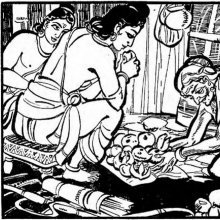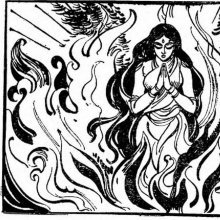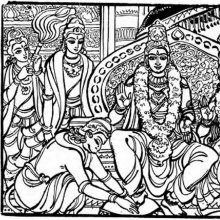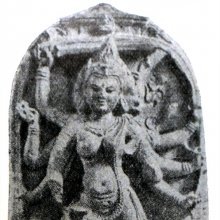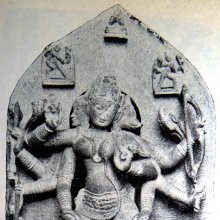Delight, Delighting, Delighted: 2 definitions
Introduction:
Delight means something in Hinduism, Sanskrit. If you want to know the exact meaning, history, etymology or English translation of this term then check out the descriptions on this page. Add your comment or reference to a book if you want to contribute to this summary article.
Images (photo gallery)
(+2 more images available)
In Hinduism
Yoga (school of philosophy)
Source: ORA: Amanaska (king of all yogas): A Critical Edition and Annotated Translation by Jason BirchThe Delight (of Yogins) is denoted by the Sanskrit term Pramoda, according to the Haṭhatattvakaumudī by Sundaradeva: a large compendium on Yoga in roughly 2000 Sanskrit verses quoting from Yoga texts, Upaniṣads, Epics, Purāṇas, Dharmaśāstras etc.—Accordingly, “Now Rājayoga is explained as far as the [fourth stage called] Niṣpatti in Haṭhayoga, for the delight (pramoda) of Yogins who have naturally ascended to Yoga through the [stage] of Niṣpatti in [Haṭha]yoga. [It is for those Yogins] whose breath, internal fire, body and mind has been mastered and whose unequivocal realization [of the highest reality] has occurred”

Yoga is originally considered a branch of Hindu philosophy (astika), but both ancient and modern Yoga combine the physical, mental and spiritual. Yoga teaches various physical techniques also known as āsanas (postures), used for various purposes (eg., meditation, contemplation, relaxation).
Shaktism (Shakta philosophy)
Source: ORA: Amanaska (king of all yogas): (shaktism)Delighting oneself (in wine and flesh) is denoted by the Sanskrit term Rata, according to the 17th century Kaulagajamardana (“crushing the Kaula elephant”) authored by Kāśīnātha or Kṛṣṇānandācala.—Accordingly, [as Īśvara said to Pārvatī]: “Listen, O Pārvatī, I shall give a critique of the Pāṣaṇḍas. Knowing this, a wise man is not defeated by them. [...] He who wears ash from the cremation ground and delights (rata) in wine and flesh; he who performs such [rites] as bathing and the junctures for [mere] worldly rewards; and he who is the vilest [of them all,] having become a hater of Viṣṇu, destroys everything; [all of them] are called Pāṣaṇḍas. [Now,] my dear, hear about the Kāpālika. [...]”

Shakta (शाक्त, śākta) or Shaktism (śāktism) represents a tradition of Hinduism where the Goddess (Devi) is revered and worshipped. Shakta literature includes a range of scriptures, including various Agamas and Tantras, although its roots may be traced back to the Vedas.
See also (Relevant definitions)
Starts with: Delightful day.
Full-text (+3329): Modita, Mudita, Modaka, Harshana, Ranjita, Prahrishta, Hlad, Abhinandana, Harshaka, Ranjana, Amodita, Paritushta, Amodana, Paritosha, Harshakara, Anuranjana, Pramodin, Anandita, Pramodita, Ahlada.
Relevant text
Search found 347 books and stories containing Delight, Delighting, Delighted; (plurals include: Delights, Delightings, Delighteds). You can also click to the full overview containing English textual excerpts. Below are direct links for the most relevant articles:
Garga Samhita (English) (by Danavir Goswami)
Verses 1.15.25-26 < [Chapter 15 - Revelation of the Universal Form to Nanda’s Wife]
Verse 8.13.45 < [Chapter 13 - A Thousand Names of Lord Balarāma]
Verse 4.7.28 < [Chapter 7 - The Story of the Ayodhya Women]
Mundaka Upanishad with Shankara’s Commentary (by S. Sitarama Sastri)
Verse 3.1.4 < [Mundaka III, Khanda I]
Verse 1.2.7 < [Mundaka I, Khanda II]
Verse 3.2.5 < [Mundaka III, Khanda II]
Dhammapada (Illustrated) (by Ven. Weagoda Sarada Maha Thero)
Verse 79 - The Story of Venerable Mahākappina < [Chapter 6 - Paṇḍita Vagga (The Wise)]
Verse 364 - The Story of Venerable Dhammārāma < [Chapter 25 - Bhikkhu Vagga (The Monk)]
Verse 354 - The Story of the Questions Raised by Sakka < [Chapter 24 - Taṇhā Vagga (Craving)]
Sahitya-kaumudi by Baladeva Vidyabhushana (by Gaurapada Dāsa)
Text 7.107 < [Chapter 7 - Literary Faults]
Text 7.36 < [Chapter 7 - Literary Faults]
Text 10.269 < [Chapter 10 - Ornaments of Meaning]
The Brahmanda Purana (by G.V. Tagare)
Chapter 49 - Conquest of the World by Sagara < [Section 3 - Upodghāta-pāda]
Chapter 21 - The Dialogue between Aurva and Paraśurāma < [Section 3 - Upodghāta-pāda]
Chapter 36 - Agastya recites the Hymn Kṛṣṇāmṛta < [Section 3 - Upodghāta-pāda]
Fundamentals of Vipassana Meditation (by Venerable Mahāsi Sayādaw)
Related products
